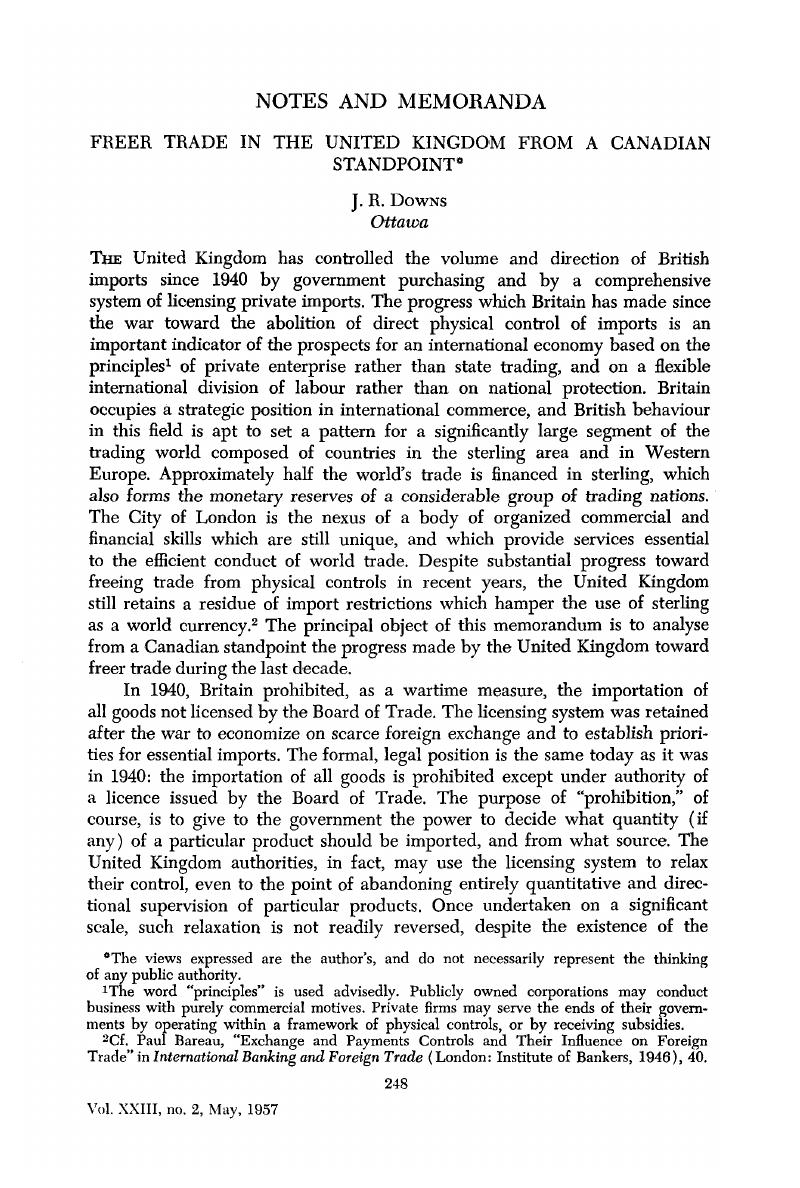No CrossRef data available.
Article contents
Freer Trade in the United Kingdom from a Canadian Standpoint*
Published online by Cambridge University Press: 07 November 2014
Abstract

- Type
- Notes and Memoranda
- Information
- Canadian Journal of Economics and Political Science/Revue canadienne de economiques et science politique , Volume 23 , Issue 2 , May 1957 , pp. 248 - 254
- Copyright
- Copyright © Canadian Political Science Association 1957
Footnotes
The views expressed are the author's, and do not necessarily represent the thinking of any public authority.
References
1 The word “principles” is used advisedly. Publicly owned corporations may conduct business with purely commercial motives. Private firms may serve the ends of their governments by operating within a framework of physical controls, or by receiving subsidies.
2 Cf. Bareau, Paul, “Exchange and Payments Controls and Their Influence on Foreign Trade” in International Banking and Foreign Trade (London: Institute of Bankers, 1946), 40.Google Scholar
3 See Hurstfield, J., The Control of Raw Materials (London, 1953), 139–43Google Scholar, for an indication of the administrative problems involved in the establishment of an import licensing system. Hurstfield's chap, x, “Import Licensing and State Purchasing,” provides background relevant to the subject of this memorandum.
4 Ibid., 143.
5 Customs provisions, of course, regulate imports. The tariffs applied by Canada and the United Kingdom to each other's products, however, may be regarded as constituting no serious obstacle to freer trade. It may be noted that, with the progress of liberalization of physical controls on trade, the role of tariffs is becoming more significant than in the recent past.
6 It is interesting to note the conclusions of a recent study that Britain has some advantages as an exporter over West Germany in respect of costs of raw materials, and that West Germany has some advantages over Britain in respect of costs of labour. “West Germany's Rising Competition with British Exports,” Board of Trade Journal, 07 28, 1956, 173–81.Google Scholar
7 These arrangements and their outcome are summarized in tabular form by Shefrin, Frank, Exports of Canadian Farm Products: War and Post-War Developments (Ottawa, 1949).Google Scholar
8 The writer would argue that de-control itself has overwhelming long-run advantages for the United Kingdom. It is virtually axiomatic, however, that the United Kingdom cannot make substantial relaxations in import restrictions in times of crisis, or even of softness, in the payments position, for both economic and political reasons.
9 See Board of Trade Notice to Importers, no. 787, 07 17, 1956.Google Scholar Also The Times, 07 4, 1956, 13.Google Scholar
10 Jacobsson, Per, “The Economic Situation of the Western World,” Skandinaviska Banken Quarterly Review, 07, 1956, 74–5.Google Scholar Also “An Economic Survey of Western Europe,” Barclay's Bank Review, 05, 1956, 25–6.Google Scholar Cf. Johnson, Harry G., “The Revival of Monetary Policy in Britain,” Three Banks Review, 06, 1956, 13.Google Scholar
11 Cf. Robinson, Austin, “The Change in Our Economic Circumstances,” Financial Times Review of Industry, 1955, 7–8.Google Scholar Also Johnson, , “Revival of Monetary Policy in Britain,” 20.Google Scholar


